Introduction : HRM professional, HRM policies, HRM theorists
VerifiedAdded on 2023/04/29
|8
|3045
|273
AI Summary
In this Document we will discuss about how human resource management (HRM) is a crucial part of the hotel industry, and how the pandemic has affected employee wellbeing and the retention of staff in the industry.
The article also provides some retention techniques suggested by HRM theorists and emphasizes the importance of creating an honest work ecosystem for retaining employees.
It includes a case example of how the Oberoi Hotel Group tackled the issue of employee retention by implementing an extensive employee well-being policy.
Ultimately, it highlights the importance of employee engagement and motivation in improving retention rates.
Contribute Materials
Your contribution can guide someone’s learning journey. Share your
documents today.
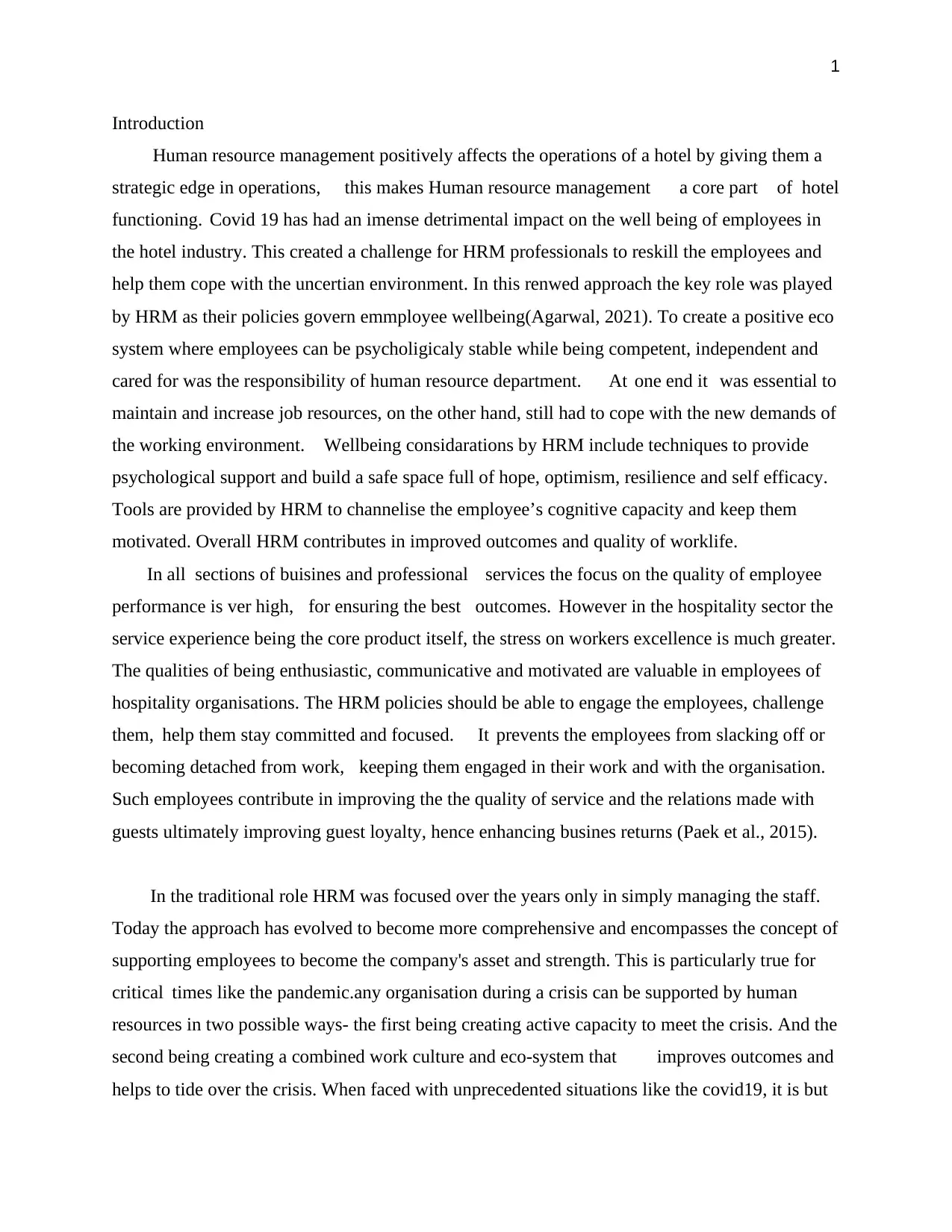
1
Introduction
Human resource management positively affects the operations of a hotel by giving them a
strategic edge in operations, this makes Human resource management a core part of hotel
functioning. Covid 19 has had an imense detrimental impact on the well being of employees in
the hotel industry. This created a challenge for HRM professionals to reskill the employees and
help them cope with the uncertian environment. In this renwed approach the key role was played
by HRM as their policies govern emmployee wellbeing(Agarwal, 2021). To create a positive eco
system where employees can be psycholigicaly stable while being competent, independent and
cared for was the responsibility of human resource department. At one end it was essential to
maintain and increase job resources, on the other hand, still had to cope with the new demands of
the working environment. Wellbeing considarations by HRM include techniques to provide
psychological support and build a safe space full of hope, optimism, resilience and self efficacy.
Tools are provided by HRM to channelise the employee’s cognitive capacity and keep them
motivated. Overall HRM contributes in improved outcomes and quality of worklife.
In all sections of buisines and professional services the focus on the quality of employee
performance is ver high, for ensuring the best outcomes. However in the hospitality sector the
service experience being the core product itself, the stress on workers excellence is much greater.
The qualities of being enthusiastic, communicative and motivated are valuable in employees of
hospitality organisations. The HRM policies should be able to engage the employees, challenge
them, help them stay committed and focused. It prevents the employees from slacking off or
becoming detached from work, keeping them engaged in their work and with the organisation.
Such employees contribute in improving the the quality of service and the relations made with
guests ultimately improving guest loyalty, hence enhancing busines returns (Paek et al., 2015).
In the traditional role HRM was focused over the years only in simply managing the staff.
Today the approach has evolved to become more comprehensive and encompasses the concept of
supporting employees to become the company's asset and strength. This is particularly true for
critical times like the pandemic.any organisation during a crisis can be supported by human
resources in two possible ways- the first being creating active capacity to meet the crisis. And the
second being creating a combined work culture and eco-system that improves outcomes and
helps to tide over the crisis. When faced with unprecedented situations like the covid19, it is but
Introduction
Human resource management positively affects the operations of a hotel by giving them a
strategic edge in operations, this makes Human resource management a core part of hotel
functioning. Covid 19 has had an imense detrimental impact on the well being of employees in
the hotel industry. This created a challenge for HRM professionals to reskill the employees and
help them cope with the uncertian environment. In this renwed approach the key role was played
by HRM as their policies govern emmployee wellbeing(Agarwal, 2021). To create a positive eco
system where employees can be psycholigicaly stable while being competent, independent and
cared for was the responsibility of human resource department. At one end it was essential to
maintain and increase job resources, on the other hand, still had to cope with the new demands of
the working environment. Wellbeing considarations by HRM include techniques to provide
psychological support and build a safe space full of hope, optimism, resilience and self efficacy.
Tools are provided by HRM to channelise the employee’s cognitive capacity and keep them
motivated. Overall HRM contributes in improved outcomes and quality of worklife.
In all sections of buisines and professional services the focus on the quality of employee
performance is ver high, for ensuring the best outcomes. However in the hospitality sector the
service experience being the core product itself, the stress on workers excellence is much greater.
The qualities of being enthusiastic, communicative and motivated are valuable in employees of
hospitality organisations. The HRM policies should be able to engage the employees, challenge
them, help them stay committed and focused. It prevents the employees from slacking off or
becoming detached from work, keeping them engaged in their work and with the organisation.
Such employees contribute in improving the the quality of service and the relations made with
guests ultimately improving guest loyalty, hence enhancing busines returns (Paek et al., 2015).
In the traditional role HRM was focused over the years only in simply managing the staff.
Today the approach has evolved to become more comprehensive and encompasses the concept of
supporting employees to become the company's asset and strength. This is particularly true for
critical times like the pandemic.any organisation during a crisis can be supported by human
resources in two possible ways- the first being creating active capacity to meet the crisis. And the
second being creating a combined work culture and eco-system that improves outcomes and
helps to tide over the crisis. When faced with unprecedented situations like the covid19, it is but
Secure Best Marks with AI Grader
Need help grading? Try our AI Grader for instant feedback on your assignments.
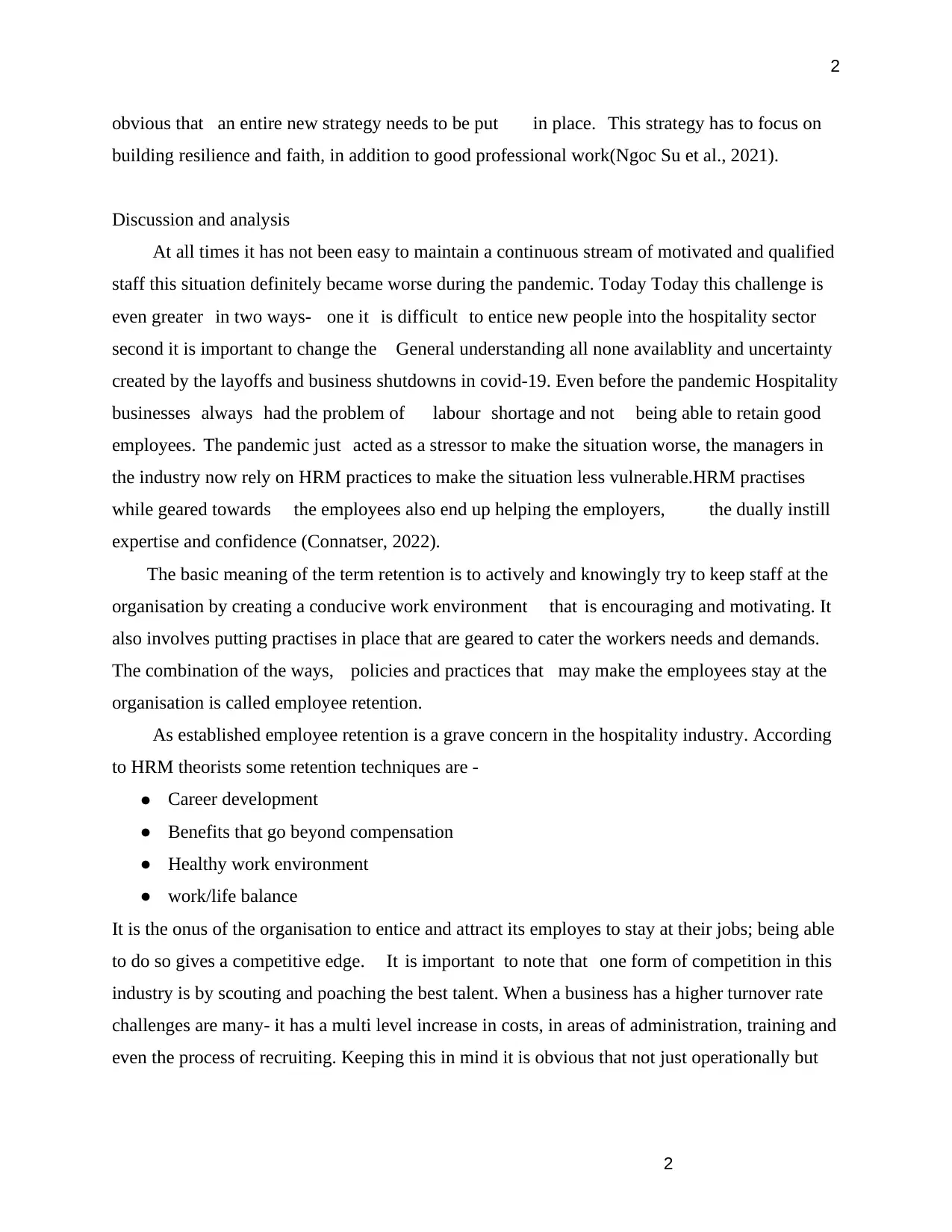
2
obvious that an entire new strategy needs to be put in place. This strategy has to focus on
building resilience and faith, in addition to good professional work(Ngoc Su et al., 2021).
Discussion and analysis
At all times it has not been easy to maintain a continuous stream of motivated and qualified
staff this situation definitely became worse during the pandemic. Today Today this challenge is
even greater in two ways- one it is difficult to entice new people into the hospitality sector
second it is important to change the General understanding all none availablity and uncertainty
created by the layoffs and business shutdowns in covid-19. Even before the pandemic Hospitality
businesses always had the problem of labour shortage and not being able to retain good
employees. The pandemic just acted as a stressor to make the situation worse, the managers in
the industry now rely on HRM practices to make the situation less vulnerable.HRM practises
while geared towards the employees also end up helping the employers, the dually instill
expertise and confidence (Connatser, 2022).
The basic meaning of the term retention is to actively and knowingly try to keep staff at the
organisation by creating a conducive work environment that is encouraging and motivating. It
also involves putting practises in place that are geared to cater the workers needs and demands.
The combination of the ways, policies and practices that may make the employees stay at the
organisation is called employee retention.
As established employee retention is a grave concern in the hospitality industry. According
to HRM theorists some retention techniques are -
● Career development
● Benefits that go beyond compensation
● Healthy work environment
● work/life balance
It is the onus of the organisation to entice and attract its employes to stay at their jobs; being able
to do so gives a competitive edge. It is important to note that one form of competition in this
industry is by scouting and poaching the best talent. When a business has a higher turnover rate
challenges are many- it has a multi level increase in costs, in areas of administration, training and
even the process of recruiting. Keeping this in mind it is obvious that not just operationally but
2
obvious that an entire new strategy needs to be put in place. This strategy has to focus on
building resilience and faith, in addition to good professional work(Ngoc Su et al., 2021).
Discussion and analysis
At all times it has not been easy to maintain a continuous stream of motivated and qualified
staff this situation definitely became worse during the pandemic. Today Today this challenge is
even greater in two ways- one it is difficult to entice new people into the hospitality sector
second it is important to change the General understanding all none availablity and uncertainty
created by the layoffs and business shutdowns in covid-19. Even before the pandemic Hospitality
businesses always had the problem of labour shortage and not being able to retain good
employees. The pandemic just acted as a stressor to make the situation worse, the managers in
the industry now rely on HRM practices to make the situation less vulnerable.HRM practises
while geared towards the employees also end up helping the employers, the dually instill
expertise and confidence (Connatser, 2022).
The basic meaning of the term retention is to actively and knowingly try to keep staff at the
organisation by creating a conducive work environment that is encouraging and motivating. It
also involves putting practises in place that are geared to cater the workers needs and demands.
The combination of the ways, policies and practices that may make the employees stay at the
organisation is called employee retention.
As established employee retention is a grave concern in the hospitality industry. According
to HRM theorists some retention techniques are -
● Career development
● Benefits that go beyond compensation
● Healthy work environment
● work/life balance
It is the onus of the organisation to entice and attract its employes to stay at their jobs; being able
to do so gives a competitive edge. It is important to note that one form of competition in this
industry is by scouting and poaching the best talent. When a business has a higher turnover rate
challenges are many- it has a multi level increase in costs, in areas of administration, training and
even the process of recruiting. Keeping this in mind it is obvious that not just operationally but
2
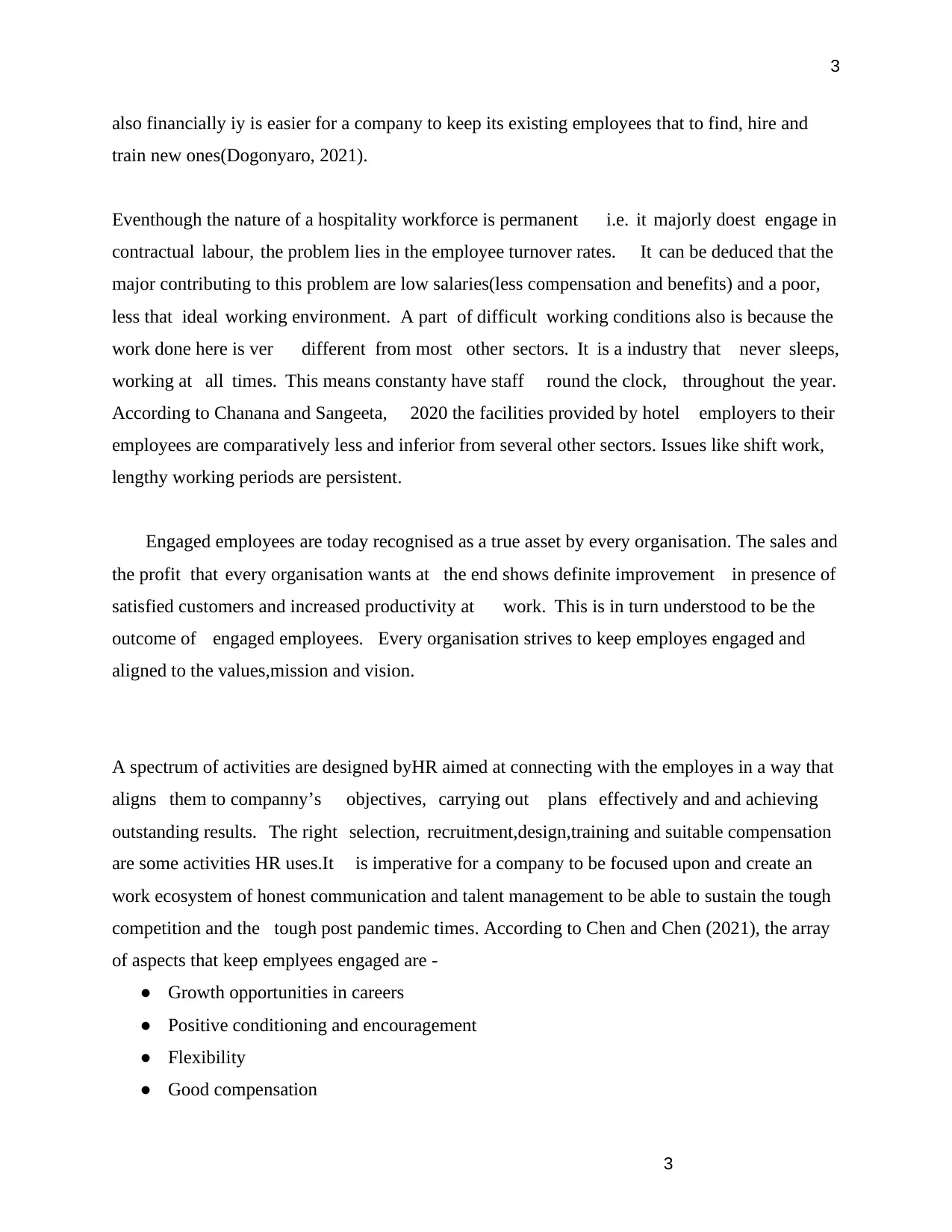
3
also financially iy is easier for a company to keep its existing employees that to find, hire and
train new ones(Dogonyaro, 2021).
Eventhough the nature of a hospitality workforce is permanent i.e. it majorly doest engage in
contractual labour, the problem lies in the employee turnover rates. It can be deduced that the
major contributing to this problem are low salaries(less compensation and benefits) and a poor,
less that ideal working environment. A part of difficult working conditions also is because the
work done here is ver different from most other sectors. It is a industry that never sleeps,
working at all times. This means constanty have staff round the clock, throughout the year.
According to Chanana and Sangeeta, 2020 the facilities provided by hotel employers to their
employees are comparatively less and inferior from several other sectors. Issues like shift work,
lengthy working periods are persistent.
Engaged employees are today recognised as a true asset by every organisation. The sales and
the profit that every organisation wants at the end shows definite improvement in presence of
satisfied customers and increased productivity at work. This is in turn understood to be the
outcome of engaged employees. Every organisation strives to keep employes engaged and
aligned to the values,mission and vision.
A spectrum of activities are designed byHR aimed at connecting with the employes in a way that
aligns them to companny’s objectives, carrying out plans effectively and and achieving
outstanding results. The right selection, recruitment,design,training and suitable compensation
are some activities HR uses.It is imperative for a company to be focused upon and create an
work ecosystem of honest communication and talent management to be able to sustain the tough
competition and the tough post pandemic times. According to Chen and Chen (2021), the array
of aspects that keep emplyees engaged are -
● Growth opportunities in careers
● Positive conditioning and encouragement
● Flexibility
● Good compensation
3
also financially iy is easier for a company to keep its existing employees that to find, hire and
train new ones(Dogonyaro, 2021).
Eventhough the nature of a hospitality workforce is permanent i.e. it majorly doest engage in
contractual labour, the problem lies in the employee turnover rates. It can be deduced that the
major contributing to this problem are low salaries(less compensation and benefits) and a poor,
less that ideal working environment. A part of difficult working conditions also is because the
work done here is ver different from most other sectors. It is a industry that never sleeps,
working at all times. This means constanty have staff round the clock, throughout the year.
According to Chanana and Sangeeta, 2020 the facilities provided by hotel employers to their
employees are comparatively less and inferior from several other sectors. Issues like shift work,
lengthy working periods are persistent.
Engaged employees are today recognised as a true asset by every organisation. The sales and
the profit that every organisation wants at the end shows definite improvement in presence of
satisfied customers and increased productivity at work. This is in turn understood to be the
outcome of engaged employees. Every organisation strives to keep employes engaged and
aligned to the values,mission and vision.
A spectrum of activities are designed byHR aimed at connecting with the employes in a way that
aligns them to companny’s objectives, carrying out plans effectively and and achieving
outstanding results. The right selection, recruitment,design,training and suitable compensation
are some activities HR uses.It is imperative for a company to be focused upon and create an
work ecosystem of honest communication and talent management to be able to sustain the tough
competition and the tough post pandemic times. According to Chen and Chen (2021), the array
of aspects that keep emplyees engaged are -
● Growth opportunities in careers
● Positive conditioning and encouragement
● Flexibility
● Good compensation
3
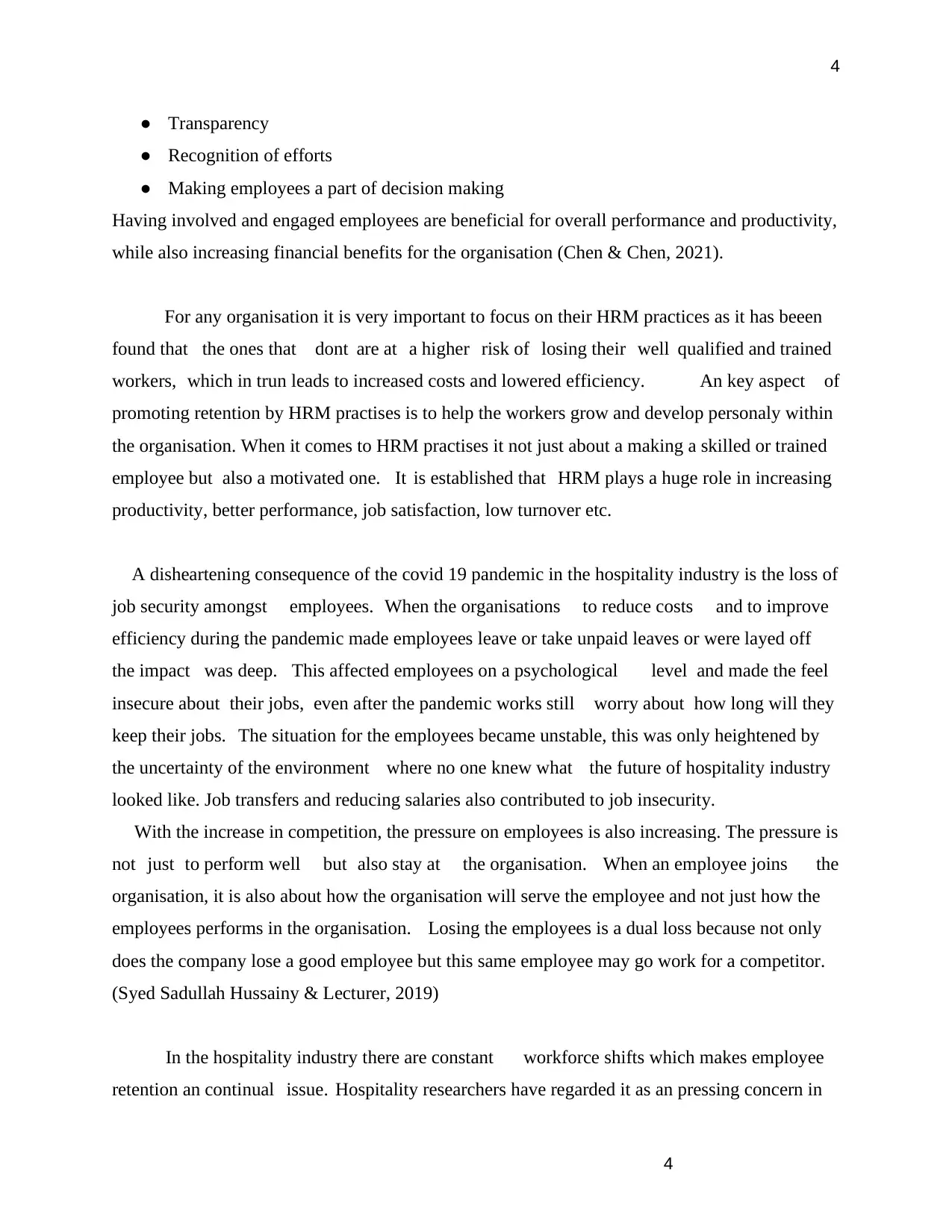
4
● Transparency
● Recognition of efforts
● Making employees a part of decision making
Having involved and engaged employees are beneficial for overall performance and productivity,
while also increasing financial benefits for the organisation (Chen & Chen, 2021).
For any organisation it is very important to focus on their HRM practices as it has beeen
found that the ones that dont are at a higher risk of losing their well qualified and trained
workers, which in trun leads to increased costs and lowered efficiency. An key aspect of
promoting retention by HRM practises is to help the workers grow and develop personaly within
the organisation. When it comes to HRM practises it not just about a making a skilled or trained
employee but also a motivated one. It is established that HRM plays a huge role in increasing
productivity, better performance, job satisfaction, low turnover etc.
A disheartening consequence of the covid 19 pandemic in the hospitality industry is the loss of
job security amongst employees. When the organisations to reduce costs and to improve
efficiency during the pandemic made employees leave or take unpaid leaves or were layed off
the impact was deep. This affected employees on a psychological level and made the feel
insecure about their jobs, even after the pandemic works still worry about how long will they
keep their jobs. The situation for the employees became unstable, this was only heightened by
the uncertainty of the environment where no one knew what the future of hospitality industry
looked like. Job transfers and reducing salaries also contributed to job insecurity.
With the increase in competition, the pressure on employees is also increasing. The pressure is
not just to perform well but also stay at the organisation. When an employee joins the
organisation, it is also about how the organisation will serve the employee and not just how the
employees performs in the organisation. Losing the employees is a dual loss because not only
does the company lose a good employee but this same employee may go work for a competitor.
(Syed Sadullah Hussainy & Lecturer, 2019)
In the hospitality industry there are constant workforce shifts which makes employee
retention an continual issue. Hospitality researchers have regarded it as an pressing concern in
4
● Transparency
● Recognition of efforts
● Making employees a part of decision making
Having involved and engaged employees are beneficial for overall performance and productivity,
while also increasing financial benefits for the organisation (Chen & Chen, 2021).
For any organisation it is very important to focus on their HRM practices as it has beeen
found that the ones that dont are at a higher risk of losing their well qualified and trained
workers, which in trun leads to increased costs and lowered efficiency. An key aspect of
promoting retention by HRM practises is to help the workers grow and develop personaly within
the organisation. When it comes to HRM practises it not just about a making a skilled or trained
employee but also a motivated one. It is established that HRM plays a huge role in increasing
productivity, better performance, job satisfaction, low turnover etc.
A disheartening consequence of the covid 19 pandemic in the hospitality industry is the loss of
job security amongst employees. When the organisations to reduce costs and to improve
efficiency during the pandemic made employees leave or take unpaid leaves or were layed off
the impact was deep. This affected employees on a psychological level and made the feel
insecure about their jobs, even after the pandemic works still worry about how long will they
keep their jobs. The situation for the employees became unstable, this was only heightened by
the uncertainty of the environment where no one knew what the future of hospitality industry
looked like. Job transfers and reducing salaries also contributed to job insecurity.
With the increase in competition, the pressure on employees is also increasing. The pressure is
not just to perform well but also stay at the organisation. When an employee joins the
organisation, it is also about how the organisation will serve the employee and not just how the
employees performs in the organisation. Losing the employees is a dual loss because not only
does the company lose a good employee but this same employee may go work for a competitor.
(Syed Sadullah Hussainy & Lecturer, 2019)
In the hospitality industry there are constant workforce shifts which makes employee
retention an continual issue. Hospitality researchers have regarded it as an pressing concern in
4
Secure Best Marks with AI Grader
Need help grading? Try our AI Grader for instant feedback on your assignments.
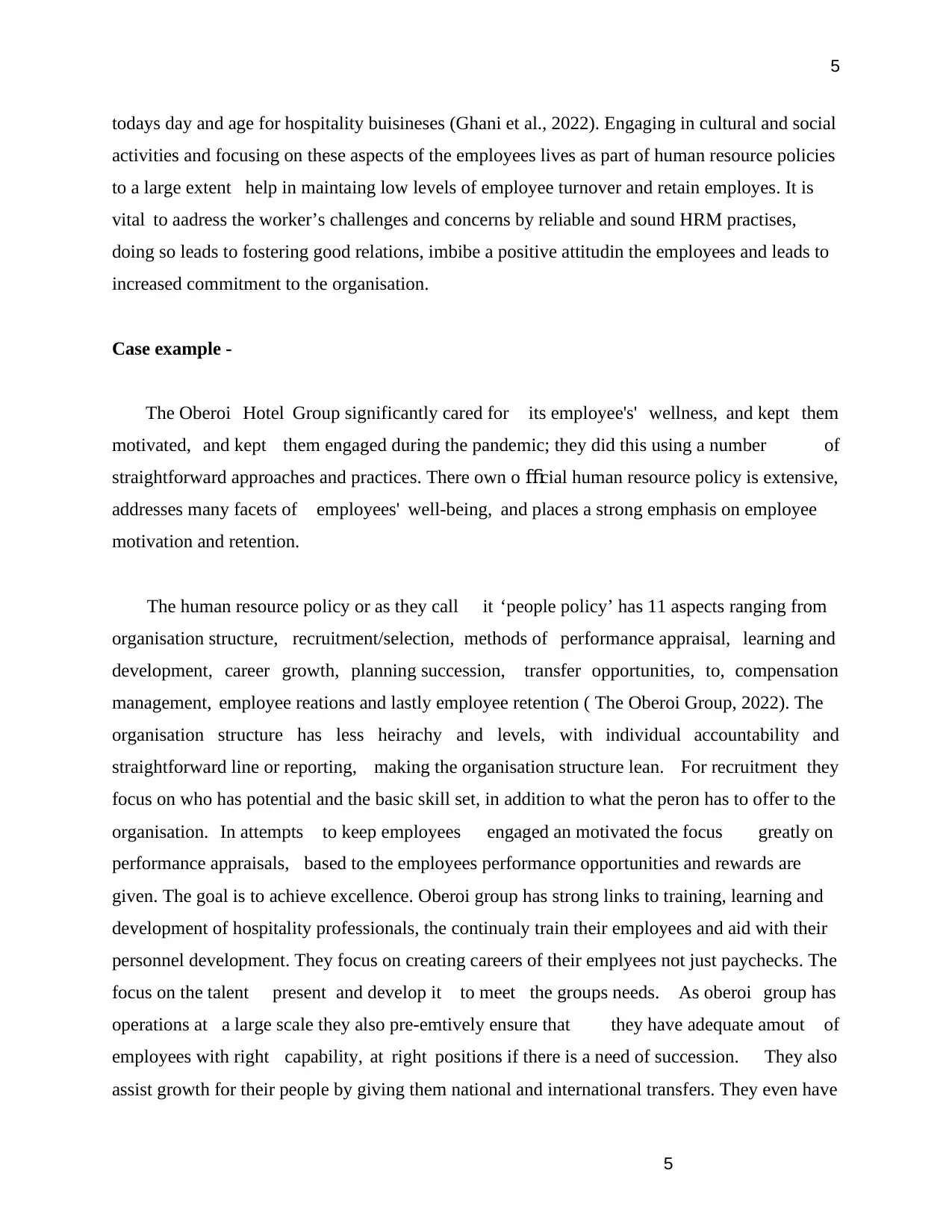
5
todays day and age for hospitality buisineses (Ghani et al., 2022). Engaging in cultural and social
activities and focusing on these aspects of the employees lives as part of human resource policies
to a large extent help in maintaing low levels of employee turnover and retain employes. It is
vital to aadress the worker’s challenges and concerns by reliable and sound HRM practises,
doing so leads to fostering good relations, imbibe a positive attitudin the employees and leads to
increased commitment to the organisation.
Case example -
The Oberoi Hotel Group significantly cared for its employee's' wellness, and kept them
motivated, and kept them engaged during the pandemic; they did this using a number of
straightforward approaches and practices. There own o fficial human resource policy is extensive,
addresses many facets of employees' well-being, and places a strong emphasis on employee
motivation and retention.
The human resource policy or as they call it ‘people policy’ has 11 aspects ranging from
organisation structure, recruitment/selection, methods of performance appraisal, learning and
development, career growth, planning succession, transfer opportunities, to, compensation
management, employee reations and lastly employee retention ( The Oberoi Group, 2022). The
organisation structure has less heirachy and levels, with individual accountability and
straightforward line or reporting, making the organisation structure lean. For recruitment they
focus on who has potential and the basic skill set, in addition to what the peron has to offer to the
organisation. In attempts to keep employees engaged an motivated the focus greatly on
performance appraisals, based to the employees performance opportunities and rewards are
given. The goal is to achieve excellence. Oberoi group has strong links to training, learning and
development of hospitality professionals, the continualy train their employees and aid with their
personnel development. They focus on creating careers of their emplyees not just paychecks. The
focus on the talent present and develop it to meet the groups needs. As oberoi group has
operations at a large scale they also pre-emtively ensure that they have adequate amout of
employees with right capability, at right positions if there is a need of succession. They also
assist growth for their people by giving them national and international transfers. They even have
5
todays day and age for hospitality buisineses (Ghani et al., 2022). Engaging in cultural and social
activities and focusing on these aspects of the employees lives as part of human resource policies
to a large extent help in maintaing low levels of employee turnover and retain employes. It is
vital to aadress the worker’s challenges and concerns by reliable and sound HRM practises,
doing so leads to fostering good relations, imbibe a positive attitudin the employees and leads to
increased commitment to the organisation.
Case example -
The Oberoi Hotel Group significantly cared for its employee's' wellness, and kept them
motivated, and kept them engaged during the pandemic; they did this using a number of
straightforward approaches and practices. There own o fficial human resource policy is extensive,
addresses many facets of employees' well-being, and places a strong emphasis on employee
motivation and retention.
The human resource policy or as they call it ‘people policy’ has 11 aspects ranging from
organisation structure, recruitment/selection, methods of performance appraisal, learning and
development, career growth, planning succession, transfer opportunities, to, compensation
management, employee reations and lastly employee retention ( The Oberoi Group, 2022). The
organisation structure has less heirachy and levels, with individual accountability and
straightforward line or reporting, making the organisation structure lean. For recruitment they
focus on who has potential and the basic skill set, in addition to what the peron has to offer to the
organisation. In attempts to keep employees engaged an motivated the focus greatly on
performance appraisals, based to the employees performance opportunities and rewards are
given. The goal is to achieve excellence. Oberoi group has strong links to training, learning and
development of hospitality professionals, the continualy train their employees and aid with their
personnel development. They focus on creating careers of their emplyees not just paychecks. The
focus on the talent present and develop it to meet the groups needs. As oberoi group has
operations at a large scale they also pre-emtively ensure that they have adequate amout of
employees with right capability, at right positions if there is a need of succession. They also
assist growth for their people by giving them national and international transfers. They even have
5
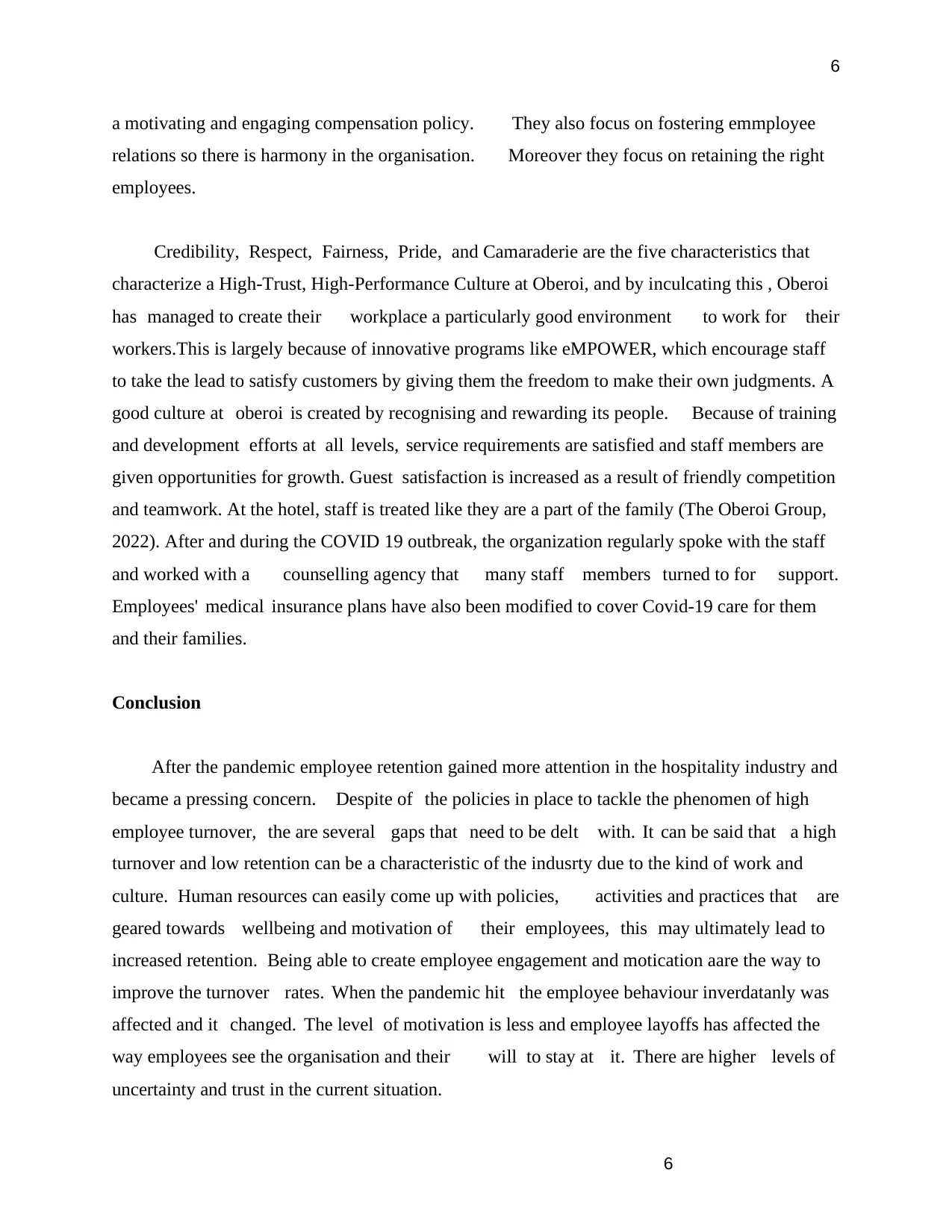
6
a motivating and engaging compensation policy. They also focus on fostering emmployee
relations so there is harmony in the organisation. Moreover they focus on retaining the right
employees.
Credibility, Respect, Fairness, Pride, and Camaraderie are the five characteristics that
characterize a High-Trust, High-Performance Culture at Oberoi, and by inculcating this , Oberoi
has managed to create their workplace a particularly good environment to work for their
workers.This is largely because of innovative programs like eMPOWER, which encourage staff
to take the lead to satisfy customers by giving them the freedom to make their own judgments. A
good culture at oberoi is created by recognising and rewarding its people. Because of training
and development efforts at all levels, service requirements are satisfied and staff members are
given opportunities for growth. Guest satisfaction is increased as a result of friendly competition
and teamwork. At the hotel, staff is treated like they are a part of the family (The Oberoi Group,
2022). After and during the COVID 19 outbreak, the organization regularly spoke with the staff
and worked with a counselling agency that many staff members turned to for support.
Employees' medical insurance plans have also been modified to cover Covid-19 care for them
and their families.
Conclusion
After the pandemic employee retention gained more attention in the hospitality industry and
became a pressing concern. Despite of the policies in place to tackle the phenomen of high
employee turnover, the are several gaps that need to be delt with. It can be said that a high
turnover and low retention can be a characteristic of the indusrty due to the kind of work and
culture. Human resources can easily come up with policies, activities and practices that are
geared towards wellbeing and motivation of their employees, this may ultimately lead to
increased retention. Being able to create employee engagement and motication aare the way to
improve the turnover rates. When the pandemic hit the employee behaviour inverdatanly was
affected and it changed. The level of motivation is less and employee layoffs has affected the
way employees see the organisation and their will to stay at it. There are higher levels of
uncertainty and trust in the current situation.
6
a motivating and engaging compensation policy. They also focus on fostering emmployee
relations so there is harmony in the organisation. Moreover they focus on retaining the right
employees.
Credibility, Respect, Fairness, Pride, and Camaraderie are the five characteristics that
characterize a High-Trust, High-Performance Culture at Oberoi, and by inculcating this , Oberoi
has managed to create their workplace a particularly good environment to work for their
workers.This is largely because of innovative programs like eMPOWER, which encourage staff
to take the lead to satisfy customers by giving them the freedom to make their own judgments. A
good culture at oberoi is created by recognising and rewarding its people. Because of training
and development efforts at all levels, service requirements are satisfied and staff members are
given opportunities for growth. Guest satisfaction is increased as a result of friendly competition
and teamwork. At the hotel, staff is treated like they are a part of the family (The Oberoi Group,
2022). After and during the COVID 19 outbreak, the organization regularly spoke with the staff
and worked with a counselling agency that many staff members turned to for support.
Employees' medical insurance plans have also been modified to cover Covid-19 care for them
and their families.
Conclusion
After the pandemic employee retention gained more attention in the hospitality industry and
became a pressing concern. Despite of the policies in place to tackle the phenomen of high
employee turnover, the are several gaps that need to be delt with. It can be said that a high
turnover and low retention can be a characteristic of the indusrty due to the kind of work and
culture. Human resources can easily come up with policies, activities and practices that are
geared towards wellbeing and motivation of their employees, this may ultimately lead to
increased retention. Being able to create employee engagement and motication aare the way to
improve the turnover rates. When the pandemic hit the employee behaviour inverdatanly was
affected and it changed. The level of motivation is less and employee layoffs has affected the
way employees see the organisation and their will to stay at it. There are higher levels of
uncertainty and trust in the current situation.
6
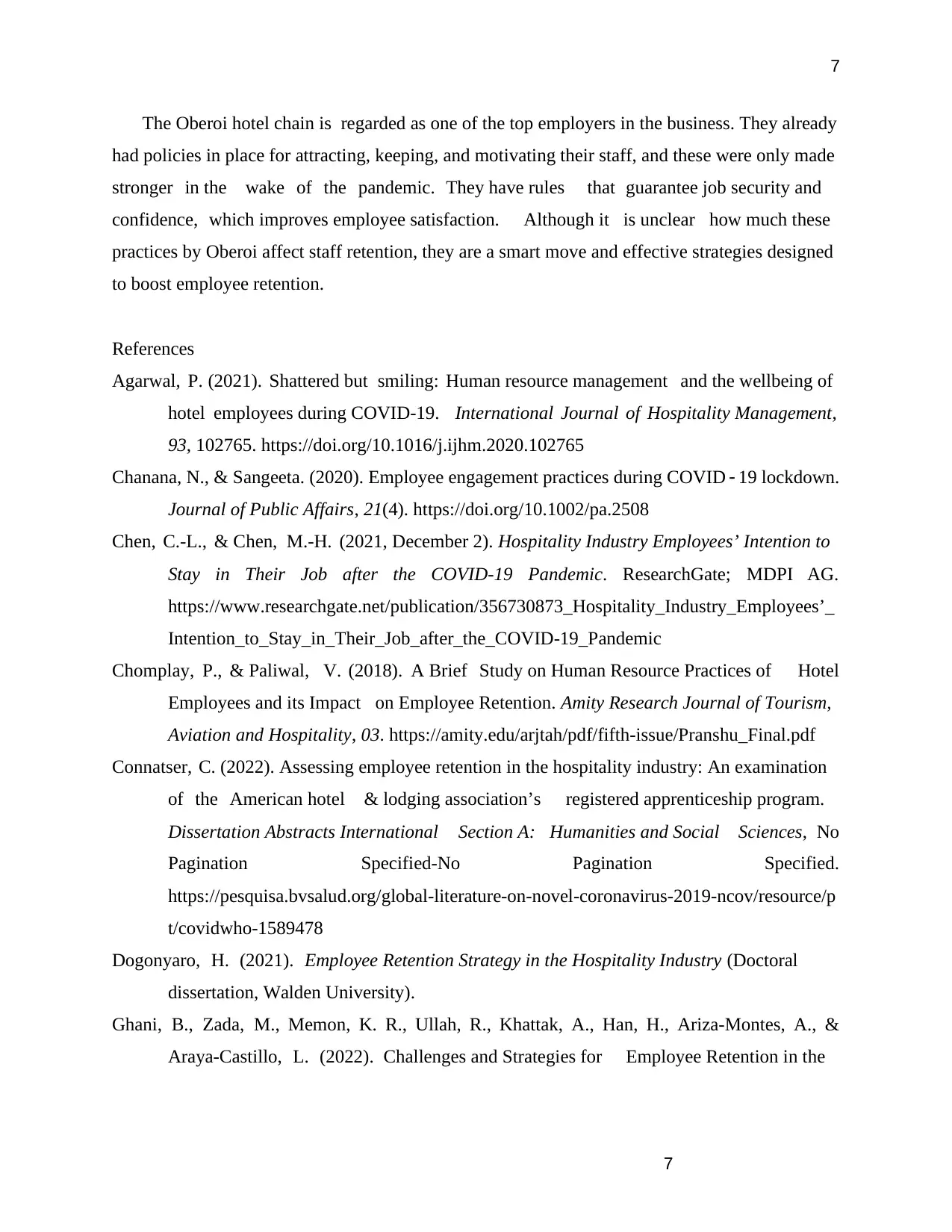
7
The Oberoi hotel chain is regarded as one of the top employers in the business. They already
had policies in place for attracting, keeping, and motivating their staff, and these were only made
stronger in the wake of the pandemic. They have rules that guarantee job security and
confidence, which improves employee satisfaction. Although it is unclear how much these
practices by Oberoi affect staff retention, they are a smart move and effective strategies designed
to boost employee retention.
References
Agarwal, P. (2021). Shattered but smiling: Human resource management and the wellbeing of
hotel employees during COVID-19. International Journal of Hospitality Management,
93, 102765. https://doi.org/10.1016/j.ijhm.2020.102765
Chanana, N., & Sangeeta. (2020). Employee engagement practices during COVID ‐ 19 lockdown.
Journal of Public Affairs, 21(4). https://doi.org/10.1002/pa.2508
Chen, C.-L., & Chen, M.-H. (2021, December 2). Hospitality Industry Employees’ Intention to
Stay in Their Job after the COVID-19 Pandemic. ResearchGate; MDPI AG.
https://www.researchgate.net/publication/356730873_Hospitality_Industry_Employees’_
Intention_to_Stay_in_Their_Job_after_the_COVID-19_Pandemic
Chomplay, P., & Paliwal, V. (2018). A Brief Study on Human Resource Practices of Hotel
Employees and its Impact on Employee Retention. Amity Research Journal of Tourism,
Aviation and Hospitality, 03. https://amity.edu/arjtah/pdf/fifth-issue/Pranshu_Final.pdf
Connatser, C. (2022). Assessing employee retention in the hospitality industry: An examination
of the American hotel & lodging association’s registered apprenticeship program.
Dissertation Abstracts International Section A: Humanities and Social Sciences, No
Pagination Specified-No Pagination Specified.
https://pesquisa.bvsalud.org/global-literature-on-novel-coronavirus-2019-ncov/resource/p
t/covidwho-1589478
Dogonyaro, H. (2021). Employee Retention Strategy in the Hospitality Industry (Doctoral
dissertation, Walden University).
Ghani, B., Zada, M., Memon, K. R., Ullah, R., Khattak, A., Han, H., Ariza-Montes, A., &
Araya-Castillo, L. (2022). Challenges and Strategies for Employee Retention in the
7
The Oberoi hotel chain is regarded as one of the top employers in the business. They already
had policies in place for attracting, keeping, and motivating their staff, and these were only made
stronger in the wake of the pandemic. They have rules that guarantee job security and
confidence, which improves employee satisfaction. Although it is unclear how much these
practices by Oberoi affect staff retention, they are a smart move and effective strategies designed
to boost employee retention.
References
Agarwal, P. (2021). Shattered but smiling: Human resource management and the wellbeing of
hotel employees during COVID-19. International Journal of Hospitality Management,
93, 102765. https://doi.org/10.1016/j.ijhm.2020.102765
Chanana, N., & Sangeeta. (2020). Employee engagement practices during COVID ‐ 19 lockdown.
Journal of Public Affairs, 21(4). https://doi.org/10.1002/pa.2508
Chen, C.-L., & Chen, M.-H. (2021, December 2). Hospitality Industry Employees’ Intention to
Stay in Their Job after the COVID-19 Pandemic. ResearchGate; MDPI AG.
https://www.researchgate.net/publication/356730873_Hospitality_Industry_Employees’_
Intention_to_Stay_in_Their_Job_after_the_COVID-19_Pandemic
Chomplay, P., & Paliwal, V. (2018). A Brief Study on Human Resource Practices of Hotel
Employees and its Impact on Employee Retention. Amity Research Journal of Tourism,
Aviation and Hospitality, 03. https://amity.edu/arjtah/pdf/fifth-issue/Pranshu_Final.pdf
Connatser, C. (2022). Assessing employee retention in the hospitality industry: An examination
of the American hotel & lodging association’s registered apprenticeship program.
Dissertation Abstracts International Section A: Humanities and Social Sciences, No
Pagination Specified-No Pagination Specified.
https://pesquisa.bvsalud.org/global-literature-on-novel-coronavirus-2019-ncov/resource/p
t/covidwho-1589478
Dogonyaro, H. (2021). Employee Retention Strategy in the Hospitality Industry (Doctoral
dissertation, Walden University).
Ghani, B., Zada, M., Memon, K. R., Ullah, R., Khattak, A., Han, H., Ariza-Montes, A., &
Araya-Castillo, L. (2022). Challenges and Strategies for Employee Retention in the
7
Paraphrase This Document
Need a fresh take? Get an instant paraphrase of this document with our AI Paraphraser
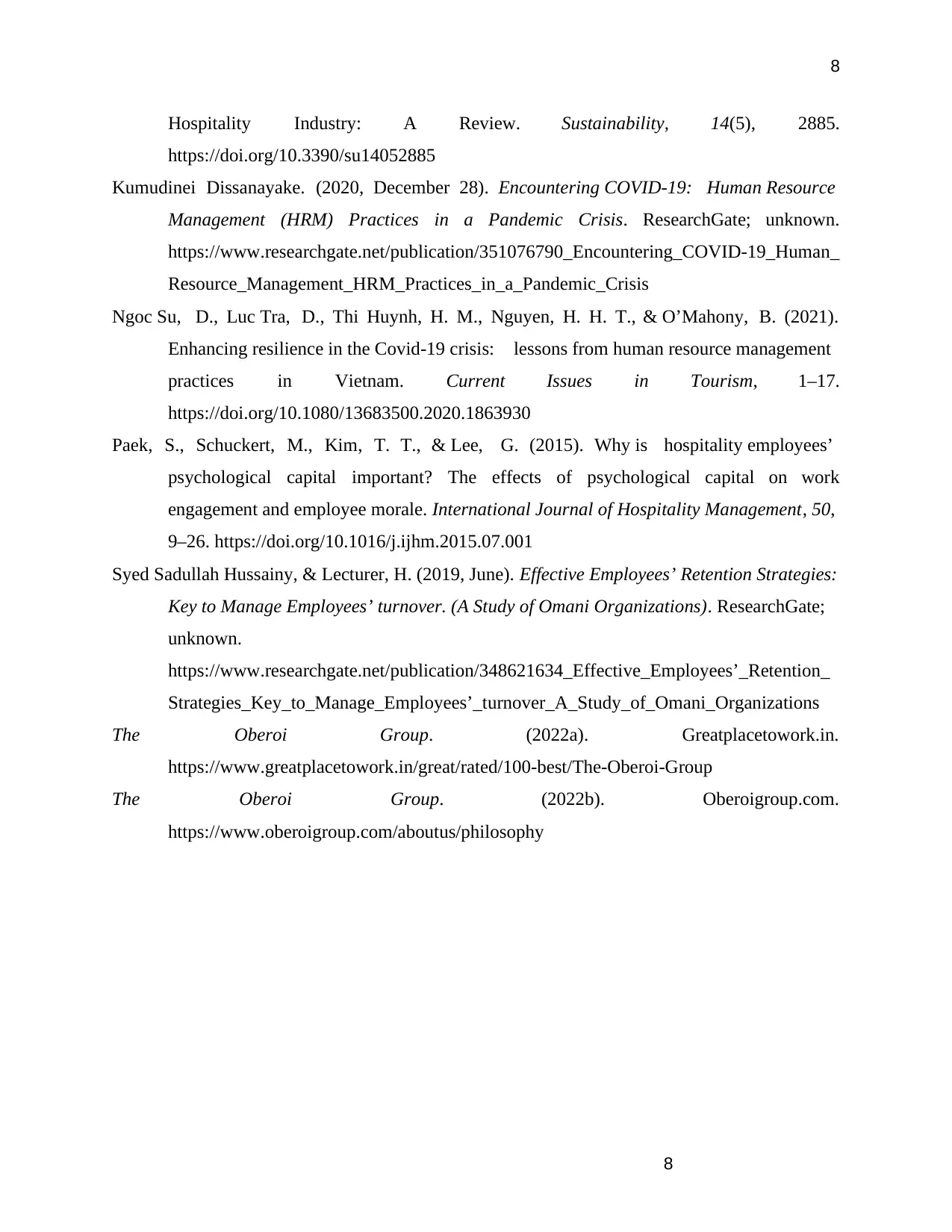
8
Hospitality Industry: A Review. Sustainability, 14(5), 2885.
https://doi.org/10.3390/su14052885
Kumudinei Dissanayake. (2020, December 28). Encountering COVID-19: Human Resource
Management (HRM) Practices in a Pandemic Crisis. ResearchGate; unknown.
https://www.researchgate.net/publication/351076790_Encountering_COVID-19_Human_
Resource_Management_HRM_Practices_in_a_Pandemic_Crisis
Ngoc Su, D., Luc Tra, D., Thi Huynh, H. M., Nguyen, H. H. T., & O’Mahony, B. (2021).
Enhancing resilience in the Covid-19 crisis: lessons from human resource management
practices in Vietnam. Current Issues in Tourism, 1–17.
https://doi.org/10.1080/13683500.2020.1863930
Paek, S., Schuckert, M., Kim, T. T., & Lee, G. (2015). Why is hospitality employees’
psychological capital important? The effects of psychological capital on work
engagement and employee morale. International Journal of Hospitality Management, 50,
9–26. https://doi.org/10.1016/j.ijhm.2015.07.001
Syed Sadullah Hussainy, & Lecturer, H. (2019, June). Effective Employees’ Retention Strategies:
Key to Manage Employees’ turnover. (A Study of Omani Organizations). ResearchGate;
unknown.
https://www.researchgate.net/publication/348621634_Effective_Employees’_Retention_
Strategies_Key_to_Manage_Employees’_turnover_A_Study_of_Omani_Organizations
The Oberoi Group. (2022a). Greatplacetowork.in.
https://www.greatplacetowork.in/great/rated/100-best/The-Oberoi-Group
The Oberoi Group. (2022b). Oberoigroup.com.
https://www.oberoigroup.com/aboutus/philosophy
8
Hospitality Industry: A Review. Sustainability, 14(5), 2885.
https://doi.org/10.3390/su14052885
Kumudinei Dissanayake. (2020, December 28). Encountering COVID-19: Human Resource
Management (HRM) Practices in a Pandemic Crisis. ResearchGate; unknown.
https://www.researchgate.net/publication/351076790_Encountering_COVID-19_Human_
Resource_Management_HRM_Practices_in_a_Pandemic_Crisis
Ngoc Su, D., Luc Tra, D., Thi Huynh, H. M., Nguyen, H. H. T., & O’Mahony, B. (2021).
Enhancing resilience in the Covid-19 crisis: lessons from human resource management
practices in Vietnam. Current Issues in Tourism, 1–17.
https://doi.org/10.1080/13683500.2020.1863930
Paek, S., Schuckert, M., Kim, T. T., & Lee, G. (2015). Why is hospitality employees’
psychological capital important? The effects of psychological capital on work
engagement and employee morale. International Journal of Hospitality Management, 50,
9–26. https://doi.org/10.1016/j.ijhm.2015.07.001
Syed Sadullah Hussainy, & Lecturer, H. (2019, June). Effective Employees’ Retention Strategies:
Key to Manage Employees’ turnover. (A Study of Omani Organizations). ResearchGate;
unknown.
https://www.researchgate.net/publication/348621634_Effective_Employees’_Retention_
Strategies_Key_to_Manage_Employees’_turnover_A_Study_of_Omani_Organizations
The Oberoi Group. (2022a). Greatplacetowork.in.
https://www.greatplacetowork.in/great/rated/100-best/The-Oberoi-Group
The Oberoi Group. (2022b). Oberoigroup.com.
https://www.oberoigroup.com/aboutus/philosophy
8
1 out of 8
Related Documents
Your All-in-One AI-Powered Toolkit for Academic Success.
+13062052269
info@desklib.com
Available 24*7 on WhatsApp / Email
![[object Object]](/_next/static/media/star-bottom.7253800d.svg)
Unlock your academic potential
© 2024 | Zucol Services PVT LTD | All rights reserved.





